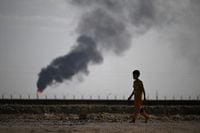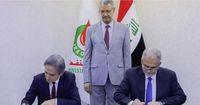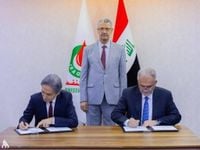Baghdad has made a significant stride in its oil export capabilities by signing an agreement to construct a subsea oil pipeline. On April 13, 2025, the Iraqi Ministry of Oil announced the collaboration with the Italian company Micoperi and the Turkish company Esta to build the pipeline, which will have a capacity of 2.4 million barrels per day.
The project, described as one of Iraq's strategic initiatives, aims to enhance flexibility and sustainability in crude oil export operations from the southern ports. According to a statement from the ministry, the Oil Basra Company has officially signed the contract for the implementation of the third offshore pipeline project dedicated to oil exports.
"The project is considered one of the important strategic projects... and aims to ensure flexibility and stability in crude oil export operations from the southern ports," the ministry's statement read.
Oil Minister Hayan Abdul-Ghani emphasized the importance of the new pipeline, stating that it is designed to alleviate potential bottlenecks in the export process. He noted that the operational capacity of the pipeline will exceed two million barrels per day, allowing for more efficient handling of Iraq's crude oil exports.
Abdul-Ghani further explained that the flexibility in the export process will come from the ability to export Iraqi oil in its raw form from three main outlets: the port of Basra, the Khor al-Zubair port, and a floating platform. This strategic positioning is expected to significantly boost Iraq's oil export capabilities.
In terms of technical specifications, the third oil pipeline project will include a 48-inch diameter pipeline stretching 61 kilometers in its marine section, in addition to 9 kilometers on land. The project will also feature two offshore platforms, one located at the Basra oil port and the other at the Al-Amaya oil port, along with a buoy for crude oil export and various related systems for electricity, communication, and cathodic protection.
This announcement comes at a time when Iraq is actively working to support its oil exports, which have seen a notable increase. Recent statistics released by the Iraqi Ministry of Oil and the State Oil Marketing Organization (SOMO) indicate that Iraq's oil exports rose for the second consecutive month in February 2025, reaching their highest levels in five months.
As the country continues to develop its oil infrastructure, the new subsea pipeline is expected to play a vital role in ensuring that Iraq can meet its export targets and maintain its position as a key player in the global oil market.
With the construction of this pipeline, Iraq is not only enhancing its export capacity but also reinforcing its commitment to stabilizing its oil production and export processes. This is particularly crucial given the fluctuations in global oil prices and the increasing competition in the energy market.
Overall, the subsea oil pipeline project marks a significant milestone for Iraq's oil industry, promising to enhance operational efficiency and support the country’s economic growth through improved export capabilities.



